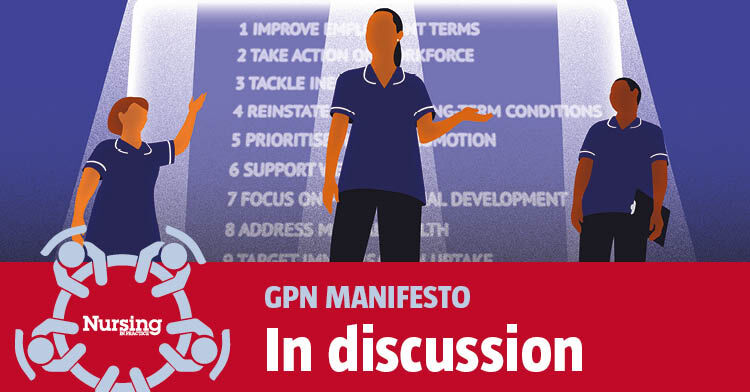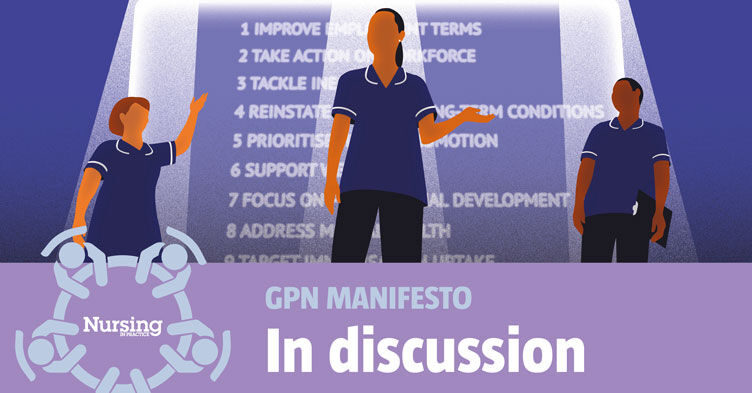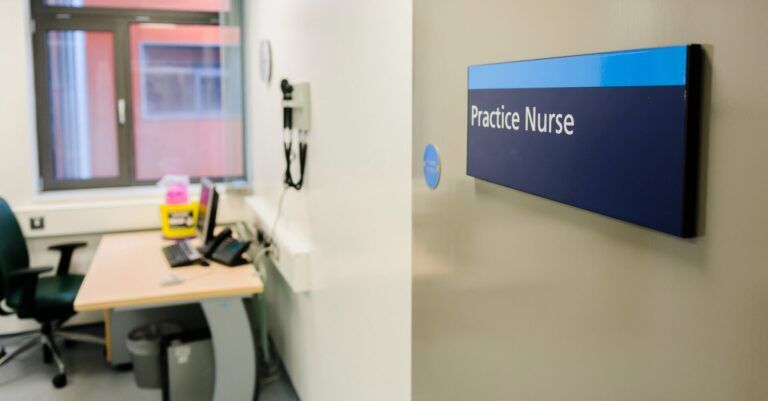Mimi Launder looks at the schemes across the UK trying to secure the next wave of practice nurses
General practice nursing is on a cliff edge, with figures showing that a third of the workforce is due to retire by 2020. But succession planning efforts are cropping up across the UK in an attempt to turn the tide back in favour of practice nursing. Backed by funding from local authorities and Government, these innovative local endeavours are working urgently to ensure the future of general practice nursing.
We have detailed a few of these initiatives across England, Wales, Scotland and Northern Ireland, and spoken to the leaders behind each one to understand the level of interest from their target audience and how they have encouraged local practices to get on board with the schemes.
GPN trainee programme pilot, Midlands and East
| Who is the programme recruiting? Newly qualified nurses, student nurses about to graduate, and experienced nurses working within the NHS.
How is it funded? With money from the £15m pot for general practice nursing in England released by the GPN 10-point plan, and STP funding. What’s covered? Employment at the equivalent of Band 5. Also covers fees for a practice nurse university course. Uptake: 30 nurses in three regions. Sites: Northamptonshire; Lincolnshire; Bedfordshire, Luton and Milton Keynes |
Gillian Beardmore, the Health Education England (HEE) primary care workforce transformation manager for East Midlands, said it was a ‘long-standing aspiration’ of hers to make it easier for nurses to move into general practice. But her idea for a GPN trainee programme only grew legs after the 10-point action plan for practice nursing was published. ‘So that’s where it came from,’ she said. ‘A long-standing recognition of the problem, from my point of view and my personal experience, recognising that we had a window of opportunity to do things differently.’
From the total funding for England of £15m, the Midlands and East General Practice Nursing Regional Delivery Board chose to spend ‘just over half of its budget’ on a proof of concept for Ms Beardmore’s idea. HEE then matched the funding, as did the Lincolnshire and Northamptonshire STPs, giving enough to cover the salaries of 20 nurses at the equivalent of Band 5, for a training period of nine months. Included in their budget was a contribution for each trainee towards a practice nurse fundamentals programme of £500 per nurse, with the remainder of the university fees already paid for by HEE.
Northamptonshire and Lincolnshire STPs, along with Bedfordshire, Luton and Milton Keynes integrated care system (ICS), are pilot sites for the programme. The University of Nottingham has been commissioned to evaluate the pilot from a workforce, HEE and NHS England perspective, and produce a guide for STPs on how to implement the scheme.
‘We’d like to show that this is a model that works and which other STPs can follow,’ Ms Beardmore explained. ‘There’s nothing across the country that has been systematically done to meet these workforce challenges.’
Northamptonshire
Miriam Coffie, head of quality at NHS England and a member of the Regional Delivery Board, identified Northamptonshire as the first potential concept site as she felt the STP had the necessary infrastructure and motivation to progress the project quickly.
Northamptonshire had been working with NHS England on the GPN 10-point plan for 18 months and leapt at the opportunity to be a pilot site. ‘In the same way as everywhere else in the country, we recognised that there was an emerging gap around practice nurses,’ said Tina Swain, head of nursing and safeguarding at Northamptonshire CCGs, who helped implement the programme. ‘We’ve got to think about the future. We can’t continue to do just traditional ways of getting nurses into practice. We had to do something different, so this coming up was absolutely fantastic.’
Ten GPN trainees began to work in practices across Northamptonshire in January with the support of mentors. One day a week, they also study a nine-month fundamentals course at De Montfort University in Leicester, which includes venepuncture, ear care, wound management and cervical cytology. However, the course only runs in January and September. ‘We were desperate to utilise the January programme for Northamptonshire,’ said Ms Beardmore. ‘It was a huge challenge to get the adverts out, to recruit, to interview, and to make sure we had the right people in place.’
PR company Altadicta helped raise the profile of training places with a social media and PR campaign. There were plenty of ‘really strong’ applicants, said Ms Swain. ‘We had nurses who were coming up, due to qualify, and we had nurses who were qualified and working in other areas and saw it as an opportunity to make a sideways move.’
The team used a ‘dating approach’ to assess the candidates, who rotated around stations where they were given questions. She added: ‘They worked together and were interviewed individually, and then as a group. It worked really, really well.’
General practices keen on taking on trainees had to have vacancies, said Ms Swain. ‘It’s not that we’ve got an additional workforce. It was looking where practices had vacancies that they needed to fill and were in a position to support the programme and support the nurses. I would expect the nurses to stay in the practices for a period of time. They may well want to move on, but what we know locally is that our nurses tend to stay within the county. They don’t tend to go externally, which is a credit to the practices. It’s growing your workforce.’
Lincolnshire
Lincolnshire joined the scheme after Ms Beadmore and Ms Coffie designed the criteria for an expression of interest application, allowing the 16 other STPs in the Midlands and East regions to register interest in the programme. Ms Beardmore said: ‘Lincolnshire were appointed on the basis that their bid was considered to be the most robust.’
Ten nurses were funded to start the GPN training programme in March across Lincolnshire. The county had a different approach to recruitment than Northamptonshire, with the CCG running the advertising and conducting the recruitment process.
Deputy chief nurse at NHS Lincolnshire West CCG Terry Vine, who is leading the implementation of the scheme for the whole of Lincolnshire, said that around 60 people applied for places. It wasn’t difficult to get 10 general practices on board either – one for each trainee to work in. Mr Vine explained: ‘If practices can be encouraged to give newly qualified nurses, or nurses new to general practice, a chance, they’ll often find there is a rich source out there. But our GPN trainee programme just gives that additional support to help encourage general practice as a good idea.’
Each trainee spends one day a week at Bishop Grosseteste University studying the fundamentals programme. Nicki Walsh, programme lead for the course, does a lot of online work with her trainees but also ensures they talk over case scenarios for it to best relate to practice. She added that the trainees are fantastic: ‘We’ve got a real range: some who have been in the acute setting for some time, one or two who have been community nurses, and some who qualified less than six months ago.’
Upon completion in November, the nurses will be offered the chance to negotiate employment in the practice they worked, if vacancies are available. Otherwise, the plan is to match up the newly qualified practice nurses with vacancies across the STP. Ms Walsh said: ‘Hopefully, they’ll stay in Lincolnshire and we’ll have other career pathways that they can follow, so they won’t need to go elsewhere. Practices want to keep them, and if you’ve planted the seed, you want it to grow and develop in your practice.’
Sarah Bluff, who qualified in 2015 and had previously worked as a treatment room nurse for 18 months, said training on the scheme had boosted her confidence. She counts herself lucky to have experience in general practice so soon after qualifying. ‘There are so many different nurses from different fields that I speak to, and they all say, “How did you get into practice? I’d love to do this, but it is so hard to get onto because of needing experience.” It’s absolutely brilliant that a course like this has been made available.’
Bedfordshire, Luton and Milton Keynes
Ms Coffie was able to further secure additional, separate funding from NHS England, who were keen to support an STP in the East region to enable major transformational change. Bedfordshire, Luton and Milton Keynes integrated care system (BLMK ICS) were awarded the funding and confirmed their commitment by providing a third of the total. Ms Coffie and Ms Beardmore are supporting the ICS with monthly meetings to monitor progress, resolving any minor issues and escalate risks to the Regional Delivery Board – just as they have with the two other pilot sites.
BLMK are currently in the process of recruiting 10 trainees for a September start. BLMK were really excited to take part in this pilot, said Ray Tariq, commissioning and operation manager (workforce) for Luton CCG. He continued: ‘It’s a new and innovative model for attracting new nurses who want to work in general practice…the pilot supports the GPN 10 Point Plan to promote general practice as a first destination career. We know that nurses have wanted to work on primary care but haven’t been able to get jobs due to a lack of experience.
‘This programme bridges the gap as it allows the trainees to gain the practical skills whilst working in a surgery and gain the theory when studying the fundamentals module at the University of Hertfordshire. By the end of the 6 months the trainees will be ‘GPN ready’ and hopefully go on to start a career in general practice.’
Jackie Marsden, a GPN lead at Luton CCG who is helping to coordinate the programme, said there was initial concern over whether nurses would be interested. But 80 people had submitted applications by the April deadline, including third year students looking to their future. Ms Marsden said: ‘They may be taking a drop in salary, they may not guaranteed to have a job at the end of their training, but they are prepared to do it because they want to train. There’s been this block, because there’s been this catch-22 whereby adverts look for experienced nurses, but you can’t get the experience until you’re in the job.’
Ms Marsden said the programme recognises that nurses ‘need a period of training and preceptorship, especially if they’re newly qualified.’ In comparison, her own training as a practice nurse was ‘very ad-hoc…You got a job as a practice nurse and, if you’ve never been one before, you just trained as you went along and I would say it took me about two years before I didn’t feel frightened to look at my screen to see what was coming in, because there might be things where I wasn’t quite sure…I think it’s great that finally there’s some funding coming into it to allow these things to happen.’
General practices that expressed an interest in the programme go through a quality assurance process, and ideally have previous experience with students or developing new-to-GPN staff. Janet Thornley, an advanced nurse practitioner at a general practice in Milton Keynes, said that her practice is currently working out how it will accommodate trainees. ‘We know we want to do the training, definitely want to get on board, but actually a lot of general practices are so busy,’ she said. ‘But I think we can all benefit from having a learner in the practice, because everybody brings a pair of fresh eyes.’
NHS Education for Scotland GPN training for newly qualified nurses
| Who is the programme recruiting? Newly qualified nurses.
How is it funded? Funding is supplied by NHS Education for Scotland to practices that apply for a training place for a GPN. What’s covered? The money covers a training place at the equivalent of Band 5 for 20 hours per week for a two-year training programme. Uptake: There are currently 30 trainees in practices around Scotland. Sites: Scotland-wide – successful applicants include practices in Renfrewshire, Glasgow and Ross and Cromarty |
Following the chief nursing officer for Scotland’s commitment to transform the nursing, midwifery and health professions workforce, two-year training places in general practice for newly qualified nurses were developed. ‘What we’re trying to do is correct the misconception that you have to be employed acutely before you come into community,’ Lynne Innes, the national coordinator for general practice nursing at NHS Education for Scotland (NES), told Nursing in Practice. ‘There was a gap in newly qualified nurses to be able to come into general practice.’
General practices were invited to apply for the funded training places in 2018. Each training place is funded at an AfC Band 5 for up to 20 hours a week, including 16 working within the practice and four hours of study leave. In return, practices need to supply trainees with a supportive learning environment. ‘We were pretty overwhelmed with the response,’ said Ms Innes on the interest from general practices.
Each trainee – of which there are currently 30 – also has a place on the 13-month NES GPN programme, which covers practical knowledge and clinical skills, and the support of NES GPN education supervisors. The trainees have been enjoying and benefiting from the programme, said Ms Innes. ‘I see the trainees on a regular basis because they come in for education and development run centrally. I’m getting quite a lot of feedback from them, and it’s actually very positive.’
There is no requirement for trainees to continue working at the GP practice after training, but Jennifer Nutkins, a GPN trainee who qualified in 2017, expects to. Her first job covering maternity leave first sparked her interest in practice nursing, but she ‘always thought you needed a lot of experience before you could get into it’. She continued: ‘We were never told that if you push for it, you can get through the door.’
When Ms Nutkins heard about the newly qualified nurse trainee programme, she thought it was a ‘brilliant’ idea. ‘I approached my local surgery and said, “Would you consider applying?”’ Since starting in September in her Highlands surgery, Ms Nutkins has gotten the ‘best of both worlds’, as she is also able to juggle the training with community bank shifts. ‘For me, it’s brilliant, but other people are saying, “I wish I’d known about that! How did you get into that?”’
Scotland are also looking to introduce a new network – similar to the GPN student nurse network in England – to better support newly qualified and student nurses in general practice. It will include GPN ambassadors from the NES GPN programme. Ms Innes said: ‘We are at an early stage of ours. We have had two meetings with GPNs and student nurses who are keen and are just about to move onto the next stage of formalising the network.’
The NES GPN training programme has been running across Scotland since 2012 for nurses new to general practice, but this is the first time newly qualified nurses have been funded to join the programme. There will be a national evaluation of the programme, which will decide how it progresses.
Northern Ireland’s ANP career development
| Who is the programme recruiting? Nurses working within the NHS in Northern Ireland who want to become advanced nurse practitioners. Applicants must hold the V300 prescribing qualification.
How is it funded? The Health and Social Care Board in NI fund 100% of the scheme. What’s covered? Places are funded to the equivalent of a Band 7 ANP. Uptake: Currently 13 trainees, with 14 more starting in the coming year. Sites: Down, Armagh and Dungannon, Derry, East Belfast |
In 2016, a general practice nursing framework was launched in conjunction with the Public Health Agency (PHA) and the Health and Social Care Board (HSCB) in Northern Ireland. It was developed to enhance the role, as well as encourage recruitment and retention, according to Gillian McCorkell, nurse consultant at the PHA. She said: ‘They needed to make sure there was sufficient protection put onto the general practice nurse so we could work with them and try to enhance their careers.’
From that framework, the PHA developed a two-year trainee advanced nurse practitioner course, fully funded by HSCB, for nurses with a V300 prescribing qualification. Alongside studying at the University of Ulster, trainees are employed at one of four GP federations in Northern Ireland: Down, Armagh and Dungannon, Derry, and East Belfast. Each is paid as a Band 7 nurse practitioner.
Kerry Brennan, previously a specialist nurse in tissue viability, is one of the 13 trainees on the scheme. During her interview for the role, when asked about what attributes she thought she might need, Ms Brennan replied ‘resilience’ – and she still stands by that now. The learning curve has been huge, she said: ‘Apart from being in tissue viability and district nursing, I’d had very little experience in primary care.’
Ms Brennan now spends three days a week working in a practice in Derry, one day a week on independent study and another studying at university. ‘It’s definitely the hardest thing I’ve done,’ she said. Upon starting the course, she got the ‘biggest culture shock’. She added: ‘You don’t belong to anybody: you’re not really the nurse you once were, but you don’t really belong to medicine either. But at the same time, I don’t mind because I think the fact that it is so tough will make it all the sweeter if I get there.’
The course is unlike anything else on offer in Northern Ireland. Previously Ms Brennan would have to train in England, which she says is unfeasible, but this programme gave her the chance to develop her career in her home country. ‘I looked at this opportunity and thought “that’s exactly what I’ve always aspired to be”,’ she said. ‘In tissue viability, I was up to a Band 7, but after that there was nowhere for me to go. I had to move onto management, but I never ever became a nurse to be a manager. I always wanted to be clinically driven.’
Catherin Platt, another trainee ANP in her first year, had experience as a prescribing practice nurse before joining the programme in September. Although she felt ‘quite happy’ in her job, she could not turn away from the opportunity once it came up. Now she works in a new practice in Belfast and feels refreshed. Without the programme, she likely would have retired in about four years. ‘That was my plan – it was getting a bit stale. But I won’t now because I’m reinvigorated again.’ The ANP trainee scheme is currently a pilot project, but Ms McCorkell maintains it is the way forward for nursing.
GPN trainee posts across north Wales
| Who is the programme recruiting? Newly qualified nurses, or nurses looking to make the transition into general practice.
How is it funded? The programme is funded by the primary care fund from the Welsh Government. What’s covered? A 12-month placement within a practice at Band 5 level. Uptake: So far, 21 trainees have taken up places. Sites: Practices across the Betsi Cadwaladr University Health Board in Bangor, north Wales. |
The practice nurse trainee post was developed by Angela Roberts, the lead nurse for primary care for the central area of the Betsi Cadwaladr University Health Board, to encourage new nurses into primary care – either newly qualified nurses or nurses looking to move into general practice.
With support from the primary care fund from the Welsh Government, it offers a 12-month clinical placement within local general practices. The nurses are employed and paid by the health board, usually at Band 5, although it can depend on their experience.
Trainees simultaneously study on a practice nursing course at either the University of Bangor or Wrexham Glyndwr University. They are expected to develop several competencies, such as wound care, travel and cytology skills, and adult and child immunisation, with support from surgeries.
Ms Roberts, who created the post three years ago and helped implement it across the health board, said: ‘I place them in a GP practice that supports the ethos of practice nurse development, and working together we develop and teach the trainees the core skills needed to develop into a safe competent practitioner.’
She continued: ‘I developed this with nurses in mind, firstly to train them up safely in a structured programme, but also to give the opportunity to bring fresh nurses into primary care. Lots of nurses want to come into primary care, but then they have to learn on the job, and they often haven’t got the necessary skills and knowledge to work in a GP practice because the traditional role and the training just don’t support it.’
The longer the programme runs, the more practices support the programme upon seeing its value, said Ms Roberts. ‘Now that the nurses are coming through the practices, they see that even though they have to invest some time in the new nurse, they are getting support in clinics. It’s also advancing their own nurse mentor, because it’s stretching them.’
Heather Bloodworth, a lecturer who teaches on the practice nurse course at the University of Bangor, said that while many of the students can find the post to be challenging, they also feel that it’s incredibly rewarding.
‘I think that some people underestimate how hard general practice nurses work, and the depth and knowledge that they’ve got to have, and the breadth of patients that they see,’ she said. ‘They do feel a little bit nervous at the beginning, because they are usually working full-time, doing academic work, and some have got family commitments as well. But as time goes by they see that their knowledge is improving.’







